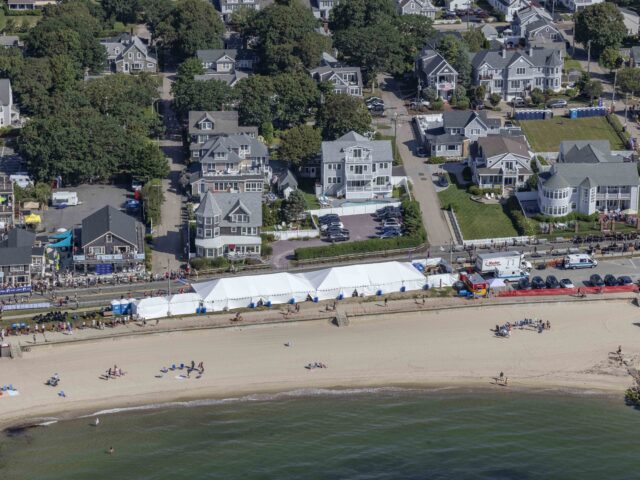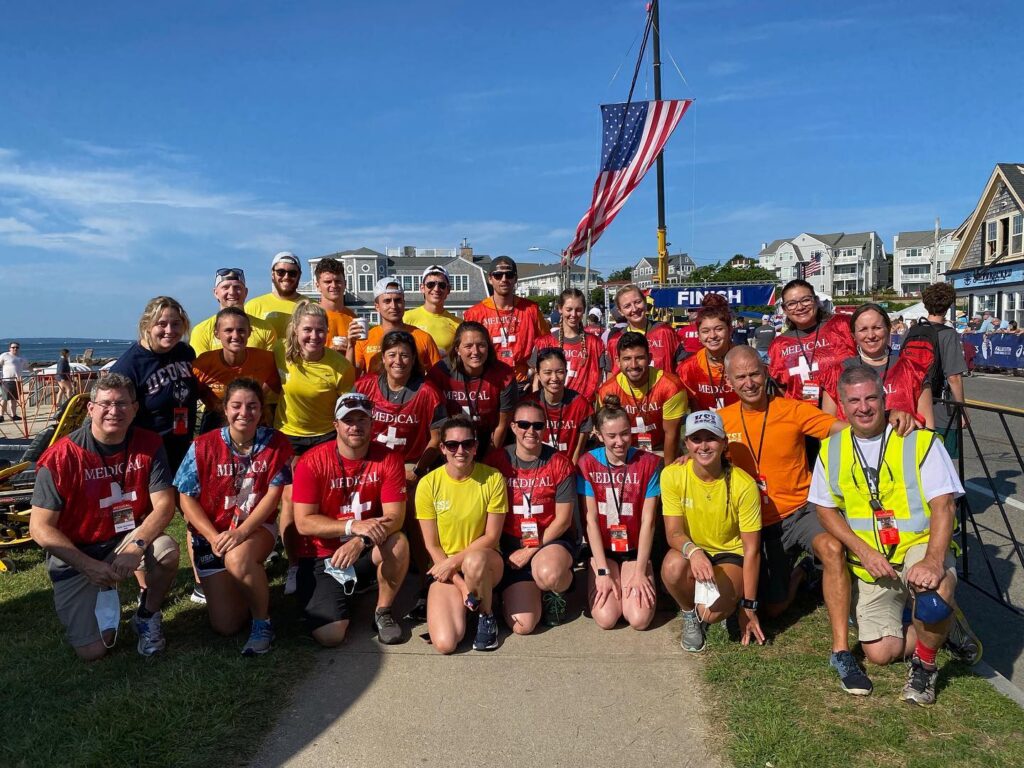Falmouth Road Race Medical Tips & FAQs
We all know how hot and humid the weather can be in August and if you’ve ever run the race, you know how much the weather can change from 6AM to 11AM! Once you come out of the woods and onto Surf Drive after Mile 3, that sun is *hot* so please take a minute and read the advice our Medical Team has offered up for you to ensure you have the best and safest race possible!
- Our Medical Team will be stationed in various locations from the start in Woods Hole to the finish in Falmouth Heights.
- That coverage will be at the start in Woods Hole, at three medical stations along the course, a Mobile Medical Team working in between each course medical station, medical staff at the finish line, and of course in the Finish Line Medical Tent.
- All medical volunteers will be in royal blueT-shirts and will be wearing medical credentials.
- If you are not feeling well, we encourage you to slow down or stop and seek support from one of our many medical or general volunteers.
- There is no charge for any medical care provided on the course or at our Finish Line Medical Tents.
- If you do require higher level medical care and an ambulance transport to Falmouth Hospital, you will be billed for that service.
- While many of our runners are under the age of 18, we do encourage you to participate with your child during the entire length of the course. Given some of our weather concerns, this is a highly recommended practice.
- All runners will have received an invitation to provide their medical history into our ‘Race Safe Program’. While we do not need your entire medical history, pertinent concerns that may impact our medical care should be listed. All of this information is only viewed by our Medical Director.
- We encourage you to follow the weather forecasts, specifically concerns regarding heat and humidity. Please see the outlined suggestions by our medical staff on how to run safely during a hot and/or humid day.
Keys to Running on a Hot Day:
- Reduce your normal race pace…. slow down! If the temperatures are warmer than normal perhaps it is not the time to worry about personal best or running at a pace faster than your training. Run at a slower pace, walk if you are feeling too warm, and seek medical attention if you are feeling the effects of heat illness.
- Listen to your body! Keep in mind that the harder you work/run the more heat your body will produce! If you are starting to feel the effects of the heat, slow down, stop if needed and rest.
- Recognize the signs and symptoms of heat illness. The general warning signs include headache, muscle cramps, nausea, vomiting, fainting, or loss of coordination.
- Recognize early warning signs of dehydration. (Dark yellow urine, loss of energy, dizziness, loss of coordination, muscle cramps, and headaches are all common warnings)
- Rehydrate as needed. How much you drink depends on your size and how hot it is during the race. A normal rule of thumb is to drink six to eight ounces of fluid (water or sports drink) every 15 minutes of exercise in the heat. By weighing in before and after a workout, you can determine exactly how much fluid is lost during your run. Remember – a pint of fluid will replace one pound of weight loss during exercise. On a very hot day, you can increase your fluid intake as much as 25% from this formula
- If you have a heart or respiratory condition, or you are on any medications, consult your doctor about running in the heat. Here again, know your body and its limitations.
- If you have a history of heatstroke or heat-induced illness, run with extreme caution.
- If you had the COVID virus in the past and are still experiencing fatigue and other post-COVID symptoms, you really need to evaluate your pace in this type of climate.
- Drink your fluids – pouring water over your head will feel great, but it does nothing to reduce your body temperature or prevent heat illness.
- Wear light-colored clothing, wear a hat, use a sun visor to protect your face from the sun. Use sunscreen to protect your skin.
- Avoid drinking coffee or any drinks with caffeine prior to the race.
- Get a good night’s sleep the night before the race. Our studies have shown that lack of sleep is a risk factor for heat illness.
A huge thank you to our Medical Committee led by our Medical Director, Dr. John Jardine, our Medical Coordinator, Chris Troyanos, our nearly 300 medical personnel and volunteers, and to the team from the Korey Stringer Institute at the University of Connecticut (KSI) who continue their life-saving research on heat-induced illness and exertional heat stroke.


